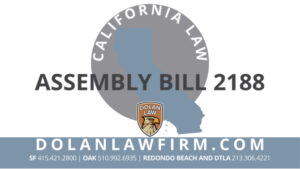Presumption of At-Will Employment:
In California, employment is presumed to be at-will. “At-will” employment means that either the employer or the employee may terminate employment at any time, with or without cause or prior notice. Generally, the at-will presumption affords employers a wide latitude to terminate employees, even in cases where the employee believes the termination was unfair, unexplained or that a mistake was made in implicating the employee in terminable conduct. This also means the employee is not generally entitled to be supplied with the reasons and justifications for their termination, though often an employer will provide this information in a termination letter, during a termination meeting or in a similar communication. An employer is not, however, required to explain themselves. Despite the general at-will presumption, there are many exceptions. For instance, there are a variety of categories of employees that are typically not considered to be employed “at-will” because some contract or agreement alters the at-will presumption. This includes:- most public-sector employees,
- employees represented by unions covered by collective bargaining agreements,
- employees with written employment agreements, and
- employees whose employers have made representations or taken action that rebutts the presumption of at-will employment, creating an implied contract to employ the employee under certain conditions.
Limitations on At-Will Employment: Actions Taken by Employers Must Still Comply with State and Federal Laws Protecting Employees and Cannot Violate Public Policy.
 Despite the presumption of at-will employment in California, employers do not possess an absolute right to discharge employees for any reason whatsoever, even at-will employees. The at-will arrangement simply protects employers from being sued for breach of implied contract requiring the employee to provide the employee with a good cause explanation for the termination. It does not, however, insulate employers from being sued for violating other laws governing employment relationships, such as discrimination, harassment, retaliation for making protected complaints (such as a complaint of sexual harassment) or engaging in protected activity (such as taking a medical leave or requesting accommodations for a medical condition or disability), statutory violations, or for terminations that violate public policy.
Despite the presumption of at-will employment in California, employers do not possess an absolute right to discharge employees for any reason whatsoever, even at-will employees. The at-will arrangement simply protects employers from being sued for breach of implied contract requiring the employee to provide the employee with a good cause explanation for the termination. It does not, however, insulate employers from being sued for violating other laws governing employment relationships, such as discrimination, harassment, retaliation for making protected complaints (such as a complaint of sexual harassment) or engaging in protected activity (such as taking a medical leave or requesting accommodations for a medical condition or disability), statutory violations, or for terminations that violate public policy.
Wrongful Termination in Violation of Public Policy
In California, a termination is considered a “wrongful termination” where an employee is terminated for an illegal reason that violates fundamental principles of public policy. Wrongful termination in violation of public policy is known as the “common law” exception to at-will employment.What is considered a “public policy”?
No precise definition of a “public policy” is provided under California law, courts have found a “public policy” in the context of a wrongful termination action to possess all four of the following characteristics:- The policy is one reflected in a constitution, statutory or regulatory provision of state or federal law;
- The policy provides some benefit to the public, as opposed to serving only a single employee, employer or private party;
- The policy is well-established at the time of termination or adverse employment action; and
- The policy is substantial and fundamental.
-
- California’s Fair Employment and Housing Act (“FEHA”) codified in Cal. Gov. Code §12900 – The act that forbids employers from discriminating, harassing and retaliating agaisnt employees based on their membership in a category protected under the act (i.e. race, gender, sexual orientation, age, disability status, among many others)
- California Family Rights Act (“CFRA”) codified in Cal Gov. Code §12945.2 – The act that affords employees certain leave rights based on medical conditions.
- California Health and Safety Code (Cal-OSHA Codes) – The act that sets the statutory law covering health and safety in the state of California, including health and safety in the workplace.
- California Business and Professions Code codified in §§16600 – The code that sets out the appropriate manner in which business can be lawfully conducted.
- California Labor Code
- State and Federal Tax Codes and Antitrust Laws
- California State Constitution
- U.S. Constitution
Who can bring a Wrongful Termination in Violation of Public Policy claim?
Only where an employer-employee relationship exists at the outset, can there be a basis for the Wrongful Termination claim. This means true independent contractors do not have standing to bring wrongful termination claims. Simply because a company refers to someone as an “independent contractor,” however, does not necessarily make it so. If the company/employer exerted significant control over the independent contractor’s actions and parameters of the work they performed, oftentimes the independent contract will be deemed as effectively an employee with standing to bring a wrongful termination case. Public employees working for government entities are also unable to bring wrongful termination actions, as public entities are only liable for acts or omissions as provided by statute. For this reason, a public employee would be able to bring causes of action under California’s Fair Employment and Housing Act should the facts of their cases support it, but would not be able to include a wrongful termination cause of action.Evidentiary Standard for Wrongful Termination Lawsuits:
In California, an employee must show by the “preponderance of the evidence” that their termination or the adverse employment action taken against them was unlawful. The preponderance of the evidence standard is much lower than that of the “clear and convincing” standard or the “beyond a reasonable doubt” standard. Effectively, for an employee to prove their wrongful termination case the employee must show it was more likely than not that the employee’s termination was unlawful. Importantly, an employee is not required to show their protected actions, whether it be reporting unlawful conduct or refusing to engage in discrimination or harassment, was the sole reason for the employer’s termination decision. Rather, the employee must,only that it was a substantial motivating reason for the termination decision. A substantial motivating reason is one that actually contributed to the termination decision being made, not one that is trivial or remote.What employee actions are protected by public policy?
Employers can be sued for wrongful termination where an employee is fired for refusing to violate the law, exercising a legal right or performing a legal obligation founded upon an important public policy. While there are a great number of public policies that may serve as a basis for a wrongful termination lawsuit, the following are the most common types of actions, also known as “protected activities,” that are considered to be shielded by California public policy:- refusing to violate the law or violate what the employee reasonably believes to be the law;
- performing a statutory obligation or report;
- exercising a statutory right or privilege;
- reporting a workplace safety violations, whether the safety violations involve environmental hazards or workplace violence; or
- reporting an alleged violation of the law or what the employee reasonably believes to be the law to the employer or to an appropriate governmental entity (commonly referred to as “whistleblowing”).
Common Wrongful Termination in Violation of Public Policy Lawsuits:
Wrongful Termination for Refusing to Engage in Unlawful Activity
Courts have long recognized an employee’s right to bring a wrongful termination suit for refusal to commit a crime such as engaging in unlawful discrimination or harassment against another employee, committing perjury, assisting in the commission of fraud or misrepresentation, releasing toxic materials into the environment, physically harming another employee, and many others. The seminal Supreme Court case of Tameny v. Atlantic Richfield Company (Arco) (1980) 27 Cal.3d 167 established that an employee could bring a tort cause of action against an employer for wrongful termination. In this case, the Court specifically examined the issue of a retaliatory termination after an employee refused to engage in unlawful activity. In Tameny, the employee alleged that Arco had fired him after 15 years of service because he refused to participate in a scheme to fix retail gasoline prices in violation of federal and state antitrust laws.Wrongful Termination for Performing a Statutory Obligation
Courts have also recognized protections for employees that have affirmative duties under the law, such as mandated reporters. If an employee were fired for carrying out a duty they had to perform by law, the employee would have grounds for a wrongful termination action. Such examples include, terminating an employee for filing a mandatory report of suspected child abuse, terminating a physician for reporting a patient’s seizures to the Department of Motor Vehicles, or terminating a staff member who reported elder abuse at a nursing home to the appropriate regulatory agency.Wrongful Termination for Exercising a Statutory Right or Privilege
Wrongful termination cases are also commonly brought where an employee is discharged for exercising a right or privilege granted to them under the law. Some common examples include:- termination for seeking a medical leave
- termination for filing a worker’s compensation claim;
- termination because of union membership and activity;
- termination for serving on a jury;
- termination for testifying at a hearing or serving as a witness;
- termination for taking time to vote in an election; and
- termination for taking meal and rest breaks.
Wrongful Termination for Reporting Workplace Safety Complaints
Employees terminated in retaliation for raising good faith complaints about workplace safety issues are protected under the law and have standing to bring a wrongful termination claim in violation of public policy. Employees may either raise workplace safety concerns internally with management or externally with a governing regulatory agency. In many cases, an employee may elect to report the safety violations internally within the company as well as lodge a formal complaint with an external agency. Both the federal and state governments have laws in place to safeguard employees in the workplace with respect to environmental factors. The federal department that oversees workplace safety is known as the Occupational Safety and Health Administration (OSHA). The state department that provides oversight of workplace safety issues is the California Department of Industrial Relations, Division of Occupational Safety and Health (DOSH). In order to protect workers and the public from safety hazards, Cal/OSHA makes it possible for people to report safety violations anonymously, though it is not necessary to do so. Indeed, to establish a claim for wrongful termination, an important element is the employer’s knowledge of the employee’s health and safety complaint. To ensure a health and safety violation is properly submitted, it is always advisable to consult with an attorney. The attorneys at The Dolan Law Firm can help you bring your information to the proper government office and advise you on steps to take to protect yourself from possible retaliation. California Labor Code § 6310 establishes employers cannot not retaliate against employees for reporting safety violations either internally or to outside government or regulatory agencies. Some of the reported safety violations that commonly serve as a basis for wrongful termination actions include:- Unsafe work practices such as removing safety mechanisms from equipment to make the equipment run faster or more efficiently;
- Unsafe working conditions such as forcing employees to work in unventilated spaces with airborne toxins
- Failure to take steps to address violence in the workplace such as allowing certain employees to create a hostile work environment through actual or threat of physical violence and aggression against other individuals in the workplace or failure to confiscate weapons not permitted in the workplace;
- Failure to follow OSHA regulations on a construction site, such as failing to secure unsafe conditions on the jobsite, failing to inspect safety equipment, permitting unlicensed individuals to operate heavy machinery, and permitting the use of alcohol and drugs on the jobsite;
- Failure to provide personal protective safety equipment in an industrial or manufacturing setting, such as helmets, gloves, auditory protection or respiratory protection equipment;
- Failing to train employees leading to unsafe operation of equipment or improper handling of toxic materials;
- Failure to protect the public from lead or other toxins used on a worksite.
Wrongful Termination for Reporting Unlawful Activity (“Whistleblowers”)
California Labor Code §1102.5 prohibits an employer from retaliating against an employee for disclosing information the employee reasonably believes to be a violation of the law either internally to upper management or to an outside government law enforcement agency. Additionally, §1102.5 prohibits an employer from making, adopting, or enforcing any rule or policy preventing an employee from disclosing information to the government or a law enforcement agency, the employee’s supervisor, another employee who has the authority to investigate or correct violations of the law, or any public investigative agency if the employee has reasonable cause to believe that the information discloses a violation of state or federal law. In effect, an employer cannot attempt to prevent employees from raising concerns about unlawful activity nor can it punish an employee from actually raising such a concern, whether or not the employee does so internally with the employer or to an outside agency. In actions brought under §1102.5, an employee must show by the preponderance of the evidence (i.e. more likely than not) that the protected activity the employee engaged in (i.e. the report of unlawful activity) was a “contributing factor” to their termination or other adverse employment action, such as demotion, discrimination harassmnet or other actions the substantially effected the employee’s working conditions. Once this is established, the employer must then demonstrate by clear and convincing evidence (i.e. highly probably to be true rather than not) that the adverse employment action occurred for legitimate reasons, independent of any protected activity engaged in by the employee. The case of Williams v. Wyndham Vacation Ownership, brought to verdict by the Dolan Law Firm in 2016 for $20 million dollars, demonstrates the power the law provides whistleblowers in California who bring wrongful termination lawsuits. The Dolan Law Firm, supported by co-counsel, represented Patricia Williams, a former employee of Wyndham Destinations, one of the largest vacation timeshare companies in the country. Williams worked for Wyndham as a timeshare sales representative. During her employment, she witnessed countless unlawful and unethical sales practices targeting elderly customers and others financially vulnerable customers amounting to widespread fraud. Williams made multiple complaints about the unlawful and unethical sales practices internally and to the Attorney General’s Office. In 2016, the Dolan Law Firm tried the case before a jury in San Francisco, presenting evidence demonstrating Wyndham fired Williams for complaining to her supervisors and the Attorney General’s Office that Wyndham sales representatives were defrauding elderly timeshare owners and other customers, that Wyndham management was aware of the fraudulent sales practices and condoned it to further increase the company’s profits. Two legal claims were presented to the jury: (1) wrongful termination in violation of public policy and (2) violation of California Labor Code §1102.5 The jury found in favor of Williams on both causes of action and returned a $20 million verdict against Wyndham for Williams’ lost wages, emotional distress, and punitive damages. To date, the Dolan Law Firm holds one of the largest verdicts for single plaintiff wrongful termination actions in the state.What is Constructive Termination?
Another type of wrongful termination action known as a “constructive termination” occurs when an employee is forced to resign from their position due to intolerable working conditions. In cases such as this, the law treats the resignation in the same manner as a wrongful termination. An employee can bring a claim for constructive termination in violation of public policy if the employee can show “the employer either intentionally created or knowingly permitted working conditions that were so intolerable or aggravated at the time of the employee’s resignation that a reasonable employer would realize that a reasonable person in the employee’s position would be compelled to resign.” (Turner v. Anheuser-Busch, Inc. (1994) 7 Cal.4th 1238, 1251.) Constructive discharge claims are generally more difficult to prove as the employee must show that their working conditions were so intolerable that a reasonable person would have felt there was no other meaningful choice but to resign from their position. This can be more difficult to show where an employer has made at least some efforts to address the employee’s concerns, even if they did not do so in the exact way the employee wished them to. If you believe you were subjected to work conditions that triggered your resignation, contact the Dolan Law Firm to evaluate your potential claims.Remedies and Damages Available in Wrongful Termination Actions:
Employees that have been wrongfully terminated in violation of public policy may be awarded a variety of different types of compensation. These damages are not simply limited to lost wages, but other types of damages as well. Depending on the specific facts of the case and the legal basis on which the wrongful termination is based, an employee may recover the following types of damages:- Lost wages and benefits and, potentially, lost future earnings
- Damages for emotional distress, pain and suffering or loss of reputation;
- Punitive damages, which are damages designed to punish the conduct of the employer if the conduct is found to be severe enough and engaged in or ratified by an officer, director or managing agent of the employer; and
- Attorneys fees and costs associated with the litigation in certain cases where such damages are provided for, such as cases brought under FEHA.











